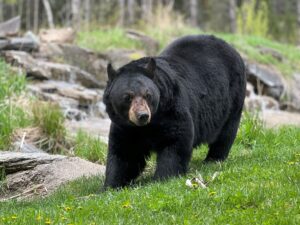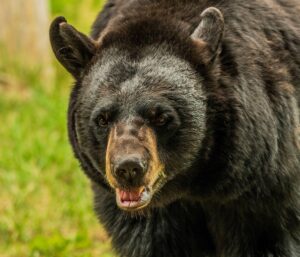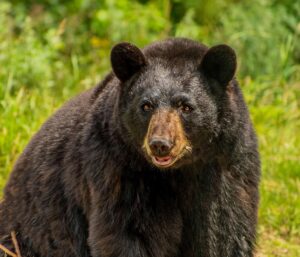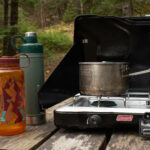Residing at one of Minnesota’s top tourism destinations, the three bears of the North American Bear Center in Ely educate and delight droves of seasonal visitors. The main purpose of close viewing interaction is to dispel the myths associated with bears, built up over a century of exaggerated stories and dramatized images. The Center’s mission is to ensure the long-term survival of bears worldwide, by exposing such misconceptions with research-based facts that define the valuable role bears play in the ecosystem.
Over the years, many bears have enjoyed and flourished under the Center’s caring conservatorship without the risks associated with survival in the wild. Two past residents, Ted and Honey Bear, are memorialized with garden plaques.
Informative staff host hourly guided tours skirting the 2.5-acre habitat, providing information in front of each bear’s personal enclosure. They invite questions and give background information on each specific animal, as well as bear biological traits in general. You can calmly observe and photograph closeup, separated by fencing and beyond paw’s reach. The bear’s attention is drawn even closer with the addition of shelled peanuts placed along the fence supports. With lightning speed, long sticky tongues snatch each nut, prized for its protein and essential fats.
The Center is far from a zoo setting, but exercises the bears both physically and for their mental curiosity (natural instincts). Bears are very intelligent and relish figuring out solutions to complex problems. The Center places toys with treats that requires some methodology to resolve and achieve the rewards. New scents (spices) are scattered throughout the grounds to generate investigation by the “worlds greatest nose.”
The habitat has plenty of room and the forest provides fallen trees, new greenery to graze upon, and plenty of climbing opportunities. They receive a varied nutritious diet of tree nuts, fresh produce, fruits, and raw eggs, along with fish oils to maintain a healthy shiny coat and soft pads. All three bears have den locations for hibernation within their individual enclosures.
Lucky
Lucky is the Center’s sole male (boar), born in 2007 in Wisconsin, where he was found orphaned. As he reached maturity, he became more aggressive with Ted, the elderly, very large, mild-mannered boar, making it necessary to keep them separated. Lucky’s playful habits have earned him the reputation as the “comedian,” frolicking with items in the main habitat in front of visitors and staff alike. He has a close relationship with Holly and will play in the water, wrestle, and simulate mating during her June estrus cycle. Holy has occasionally permitted him to hibernate with her in the same den site. Contrarily, he is indifferent to Tasha, the younger 9-year-old female (sow). Even during her estrus breeding period, he rejects her advances every time.

Holly
Born January 2013 in the wilds of Arkansas, a forest fire tragically separated Holly from her mother. She was found crying and singed, unable to survive without intervention. Today, she remains the matriarch and keeps the others in-line with an “iron paw,” typical of the social structure of wild black bears. She sees Tasha as competition during the “rut” or mating season. Since Lucky had been neutered, there is no chance of producing cubs. Holly enjoys roaming the perimeter of the grounds and hides in the underbrush to dart out.

Tasha
The youngest of the three bears, Tasha was born in 2015 in southern Kentucky. She was found trying to nurse from her dead mother, after she had succumbed to injuries from being hit by a truck. Taken in and raised unrestricted on a farm, she played with dogs and learned to use her paw to request food—a trick she taught to the others. A little more subdued, she takes solace in sitting in her wash tub and suckles her toes like a nursing cub, while humming a tune of self contentment. She is always open to sampling new food, and like all bears, everything revolves around mealtime.

The Center welcomes seasonal visitors and can accommodate groups. The gift shop offers souvenirs, from which proceeds go back into supporting their activities. For more information, call 218-365-7879 or
visit: bear.org.




